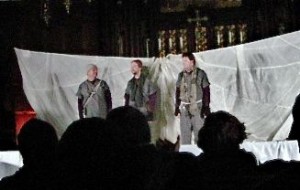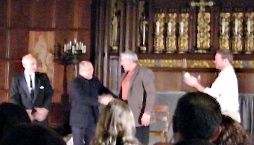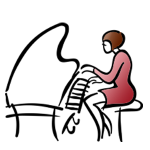On Thursday last week, I got an email from a musical colleague about “Boys’ Night Out,” a chamber opera and art song performance happening the following evening at the Church of St. John the Evangelist in Boston. It included works by several American composers, including a couple of world premieres, sung by baritones David Kravitz, Sumner Thompson, John Whittlesey, with pianist James Busby accompanying.
To be honest, I had been looking forward to a quiet Friday night at home with McDoc; the weather was nasty and Friday had promised to be a welcome break in an otherwise full schedule. But having been made aware of a group that describes itself thusly:
Intermezzo was born out of a vision to produce contemporary chamber operas and bring new and exciting works to the musical life in New England. Chamber opera merges the musical and dramatic flavor of grand opera with the immediacy of art song, performed on a smaller, more intimate scale. Our focus is on performing contemporary 20th and 21st century chamber works, particularly by American composers, and sung in English.
…I had to find out more! Plus, I had heard two of the three singers on other occasions, and I’ve sung in a pick-up choir directed by Mr. Busby. I knew I’d be in good musical hands. Click Mr. Readmore for the full story!
The performance had three parts:
The Andrée Expedition, by Dominick Argento
De Profundis, by Thomas Oboe Lee
The Suit Suite: Four Songs About Clothing, by various composers
Floating Over Ice
The Andrée Expedition tells the story of three men’s attempt to reach the North Pole in a helium balloon. Salomon August Andrée, Nils Strindberg and Knut Fraenkel lifted off from Svalbard, Sweden in July 1897, and were not heard from again. 33 years later, their bodies were discovered, along with letters and journals they kept during their ill-fated journey.
Those recovered documents form the opera’s text. The work was originally performed by one singer, baritone Håkan Hagegård, but Intermezzo staged it with a different baritone for each of the three characters represented.
David Kravitz plays Andrée, the leader of the expedition, who is either overly optimistic in his trust of the technology involved, or aware that his mission is doomed but committed to it nonetheless.
John Whittlesey plays Knut Fraenkel, whose journal entries consist entirely of weather and other scientific data, and who also serves as a sort of narrator. As stage director Kirsten Z. Cairns noted in her charming introductory remarks, Strindberg appears to be aware that he and his fellow travelers have already perished, telling their story from his more informed vantage point.
Sumner Thompson, as Nils Strindberg, sings his letters to his fiancée, Anna, whom he hopes to return to. Aha! You know it’s an opera, because there’s an ill-fated love story!
The set was simple and stark, conjuring the icy landscape into which the three explorers ventured: white cloth draped the pulpit and altar rails, and what looked like the team’s deflated balloon, also white, was strung across the back of the set. I was impressed by set designer William A. Fregosi’s ability to do more with less, conjuring the vast, icy landscape with just a few visual cues.
The music was stark as well, framed by a crystalline motif in the piano’s high register at the beginning and end of the piece. The program notes described Argento’s music as “freely combin[ing] tonality, atonality and a lyrical use of twelve-tone writing,” and that musically omnivorous approach served to differentiate the three characters, with flashes of romanticism underlaying Strindberg’s letters to Anna, and more spare and desolate music illustrating the observations of Andrée and Fraenkel.
I could never quite put my finger on what was happening harmonically, though; the music seemed to hover endlessly, which was certainly appropriate to the story, though I did find myself longing for a place to land, even momentarily. The piano writing did do a good job of supporting the singers without covering them.
Passion from the Depths
De Profundis, with music by Thomas Oboe Lee and libretto by Jesse Martin, sets a portion of the famous letter Oscar Wilde (played by John Whittlesey) wrote to Alfred Douglas from prison. In his notes, the composer remarks upon the enormous task of condensing the original 118 pages down to a page and a half.
The music was lush and passionate, which suited the text perfectly, with its meditations on love, beauty and sorrow. Unfortunately, the appassionato piano writing threatened to overpower the voice at times. (Baritone John Whittlesey has a plenty big voice, but the piano in the church is also very powerful – I know from performing on it.) More than once, I found myself wishing the piano music would ease up and breathe for a bit so I could absorb the weight of the text. But I did enjoy the manic waltz that developed when Wilde began to speak of his impending release. I also loved the ending, which has Wilde exiting down the center aisle, inhaling the perfume of his rose boutonnière while still singing of sorrow and beauty intertwined.
Love and Death, Made to Measure
When baritone David Kravitz discussed how the Suit Suite came to be, he remarked that the idea music about clothing seemed rather flimsy conceptually, but “the name itself made the project worth pursuing” – I couldn’t argue with that! Inspired by a joke oft-told by his father (which he didn’t retell, so we had to use our imaginations), the suite pairs two music theatre show-stoppers, “The New Suit (Zipperfly)” by Marc Blitzstein and “Sam, You Made the Pants Too Long” by Sam Lewis and Victor Young, with two newly-commissioned works, James Yannatos‘ setting of Robert Herrick’s “Delight in Disorder,” and Andy Vores‘ setting of Pablo Neruda’s “Ode to Clothes.”
“Zipperfly” is a delight from start to finish, from opening nonsense syllables to the plaintive refrain of a man who wants nothing more than a well-tailored bespoke suit. You’d never believe that a word as silly as the one in the title could be sung with such longing and tenderness until you hear David Kravitz do it, but that repeated gesture only serves to enhance the humor of the song.
At the same time, there is something profound about it; for one thing, the man, sings of being buried in this wonderful suit as well as striding proudly down the sidewalk in it. The Neruda/Vores song also contemplates the concept of one’s last outfit, and in the Herrick/Yannatos song, we can read between the lines of lace, ribbon and petticoats to find desire. There you have it: love and death – just in case you were wondering what these songs were doing on an opera program!
Miss Music Nerd Recommends:
Dominick Argento: The Andrée Expedition
Mark Blitzstein: Selected Songs









PS — The man standing next to Thomas Oboe Lee in the picture of the De Profundis curtain call isn’t me, but librettist Jesse Martin.
Thanks for that — I’ve updated the photo caption. 🙂